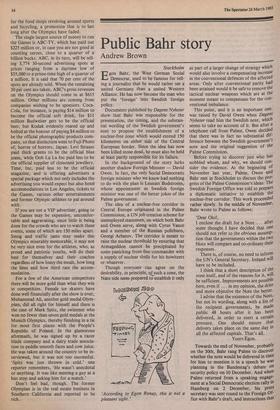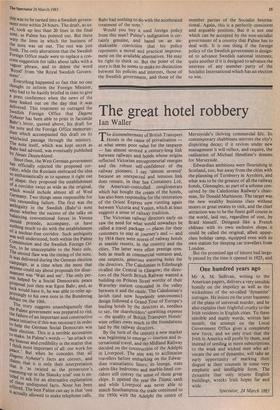Public Bahr story
Andrew Brown
Stockholm Egon Bahr, the West German Social Democrat, used to be famous for tell- ing a journalist that he would rather see a united Germany than a united Western Alliance. He has now become the man who put the `foreign' into Swedish foreign policy.
Documents published by Dagens Nyheter show that Bahr was responsible for the presentation, the timing, and the substan- tial wording of the Swedish government's note to propose the establishment of a nuclear-free zone which would extend 150 kilometres on either side of the Central European border. Since the idea has now been killed stone dead, he must also be held at least partly responsible for its failure.
In the background of the story lurks another shadow Foreign Minister — David Owen. In fact, the only Social Democratic foreign minister who we know had nothing to do with the plan is Lennart Bodstroem, whose appointment as Swedish foreign minister was one of the better jokes of the Palme government.
The idea of a nuclear-free corridor in Central Europe originated in the Palme Commission, a UN job creation scheme for unemployed statesmen, on which both Bahr and Owen serve, along with Cyrus Vance and a member of the Russian politburo, Georgi Arbatov. The corridor is meant to raise the nuclear threshold by ensuring that Armageddon cannot be precipitated by some panicking front-line commander with a supply of nuclear shells for his howitzers or whatever.
Though everyone can agree on elle desirability, in principle, ofsuch a zone, the Nato side seem prepared to establish it only 'According to Egon Ronay, this is not a pleasant sight.' as part of a larger change of strategy which would also involve a compensating increase in the conventional defences of the affected areas. Only after conventional parity had been attained would it be safe to remove the tactical nuclear weapons which are at the moment meant to compensate for the con- ventional imbalance.
This point, and it is an important one, was raised by David Owen when Dagens Nyheter read him the Swedish note, which seems to take no account of it. But after a telephone call from Palme, Owen decided that there was in fact no substantial dif- ference between the Swedish government's note and the original suggestion of the Palme Commission.
Before trying to discover just who has nobbled whom, and why, we should con- sider the evidence. At the beginning of November last year, Palme, Owen and Bahr met in Stockholm to discuss the pro- gress of the Palme Commission's ideas. The Swedish Foreign Office was told to prepare a diplomatic initiative to establish the nuclear-free corridor. This work proceeded rather slowly. In the middle of November, Bahr wrote to Palme as follows:
'Dear Olof,
I enclose the draft for a Note ... after some thought I have decided that one should not refer to the obvious assumn- tion that the governments within the two blocs will compare and co-ordinate their responses.
There is, of course, no need to inforrn the UN's General Secretary. Ireland Will have to be included.
I think that a short description of the zone itself, and of the reasons for it, Will be sufficient. Improvements are possible here, even if. in my opinion, the drier and more objective the Note the better.
I advise that the existence of the Note, but not its wording, along with a list of the recipient governments, be made public 48 hours after it has been delivered, in order to exert a certain pressure. One should ensure that delivery takes place on the same day in all the affected capitals. That's all.
Yours Egon.
Towards the end of November, probablY on the 30th, Bahr rang Palme to discover whether the note would be delivered in time for him to mention it in a speech he Was planning in the Bundestag's debate on security policy on 10 December. And when Palme returned from a speaking engage- ment at a Social Democratic election rally In Hamburg on 2 December, his press secretary was sent round to the Foreign Of- fice with Bahr's draft, and instructions that
this was to be turned into a Swedish govern- ment note within 24 hours. The draft, asus- ed, took up less than 20 lines in the final note, as Palme has pointed out. But these were the lines in which the business of the note was set out. The rest was just froth. The only alterations that the Swedish Foreign Office made were to replace a con- crete suggestion for talks about talks with a Vaguer phrase, and to delete the word 'Royal' from 'the Royal Swedish Govern- Mein'
Everything happened so fast that no one thought to inform the Foreign Minister, Who had to be hastily briefed in time to give a Press conference when the news of the note leaked out on the day that it was delivered. This treatment so outraged the Swedish Foreign Office that Dagens NYheter has been able to print in facsimile Etahr's letter, quoted above, his draft for the note and the Foreign Office memoran- durn which accompanied this draft on its Whirlwind passage through the ministry. The note itself, which was kept secret as Bahr had advised, was eventually published by Neues Deutschland. Since then, the West German government has officially rejected the proposed cor- ridor, while the Russians embraced the idea S o enthusiastically as to squeeze it right out of shape: they proposed the establishment of a corridor twice as wide as the original, which would include almost all of West Germany. Two things seem responsible for this resounding failure. The first was the ambiguity in the Swedish (Bahr's) note about whether the success of the talks on balancing conventional forces in Vienna should precede, accompany, or have n?Ining much to do with the establishment of a nuclear-free corridor. Such ambiguity was well understood, both within the Palme .orrirnission and the Swedish Foreign 0f- !lice, to The be unacceptable to the Nato side. second flaw was the timing of the note. t was delivered during the German election Carnpaign, at a time when the most that anyone could say about proposals for disar- Manient was 'Wait and see'. The only per- son helped by a Social Democratic peace rroPosal just then was Egon Bahr, and, as tick would have it, he was able to refer ap- Provingly to his own note in the Bundestag debate on the 10th. thile story suggests unambiguously that ,Le Patine government was prepared to risk '"e failure of an important and constructive Peace initiative if this was necessary in order th° elP the German Social Democrats win elr election. This is a terrible accusation 'O Make. In Palme's words — 'an attack on honour and credibility in the matter that think most important of all: our work for Peace .' But when he concedes that all c"1,i7ens Nyheter's facts are correct, and 0.alms that it is only their interpretation suat 'as twisted as the prosecutor's „Inntrung-up in the Slansky trial' one is en- "Ted to ask for an alternative explanation these undisputed facts. None has been I fered. The best Palme can say is that 'one is actually allowed to make telephone calls.
Bahr had nothing to do with the accelerated treatment of the note.'
Would you buy a used foreign policy from this man? Palme's indignation is cer- tainly genuine, and based on an un- shakeable conviction that his policy represents a moral and practical improve- ment on the available alternatives. He may be right to think so. But the point of the story is that he seems to make no distinction between his policies and interests, those of the Swedish government, and those of the member parties of the Socialist Interna- tional. Again, this is a perfectly consistent and arguable position. But it is not one which can be accepted by the non-socialist government of a country that Palme has to deal with. It is one thing if the foreign policy of the Swedish government is design- ed to advance Swedish national interests; quite another if it is designed to advance the interests of any member party of the Socialist International which has an election to win.















































 Previous page
Previous page